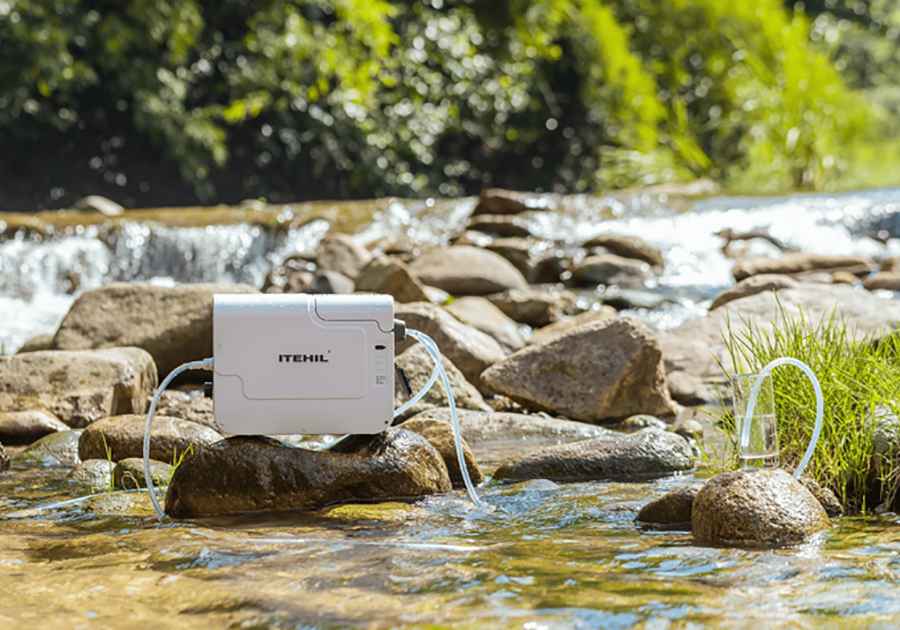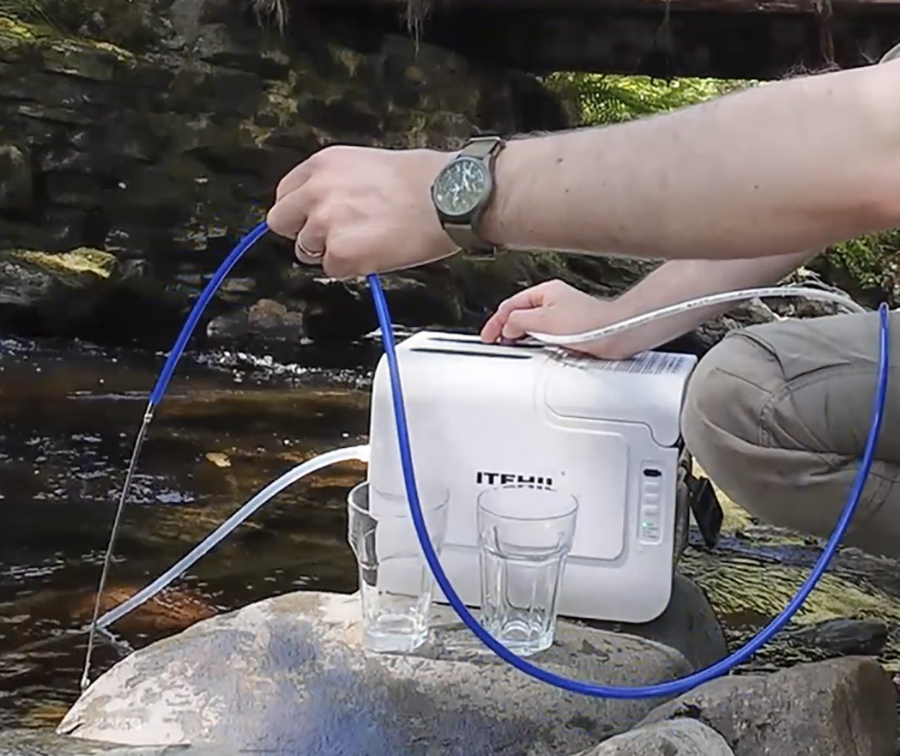How to Choose the Right Water Filter for Your RV
Selecting the best RV water filters is essential for ensuring safe drinking water during RV travel and camping. Water quality can differ significantly from one location to another, and even seemingly clear water may contain hidden impurities or contaminants. A high-quality filter is vital to safeguard your health while enjoying RV camping. Unfiltered water can pose health risks, so investing in the best RV water filters protects your well-being and adds convenience to your travels. You have the option to test water samples at a lab or rely on a dependable filtration system. The latter provides peace of mind throughout your adventures.

Understanding Water Sources
When you're on an RV travel adventure, understanding your water source is crucial. Different sources mean different filtration needs. Let's dive into the types of water you might encounter during your RV camping trips.
City Water
Urban water usually comes from municipal water supplies. This water usually goes through treatment processes to remove harmful contaminants. However, city water may still contain chlorine and other chemicals that affect taste and smell. You might notice a chemical taste in city water. That's where filtration becomes essential.
Characteristics of City Water
City water typically contains chlorine for disinfection. This water might also have trace amounts of heavy metals or sediments. Municipalities treat city water to meet safety standards, but some impurities can linger.
Filtration needs for city water
For city water, a carbon filter works wonders. This type of filter removes chlorine and improves taste. For city water, a carbon filter works wonders. This filter removes chlorine and improves the taste. A reverse osmosis water filter also removes all harmful impurities like heavy metals. These water filters ensure that you get safe and pleasant-tasting water during your RV trip.
Well Water
Well, water presents a different challenge. This water often comes from underground sources and varies greatly in quality. Well water might contain bacteria, viruses, or other contaminants. Filtration becomes even more critical here.
Characteristics of well water
Well, water can have high levels of minerals like iron or sulfur. This water might appear cloudy or have a distinct odor. Contaminants like bacteria or viruses pose health risks.
Filtration needs for well water
A comprehensive filtration system is necessary for well water. Consider using a sediment filter to remove particles. Follow this with a UV purifier to tackle microorganisms.
Other Environmental Water
Sometimes, you'll encounter water from lakes, rivers, or other natural sources. These sources can be unpredictable. Filtration becomes crucial to avoid health risks.
Other environmental water characteristics
Environmental water sources might contain algae, sediments, or pollutants. Discoloration or foul smells often indicate contamination. Old septic systems near water pipes can create a toxic mix.
Other environmental water filtration needs
For environmental water, a multi-stage filtration system works best. Use a sediment filter to catch larger particles. An activated carbon filter improves taste and removes chemicals. A UV purifier adds an extra layer of protection against microorganisms. Reverse osmosis filters can remove all harmful substances from the water. This combination ensures clean and safe water for your RV travel.
Types of Water Filters
Choosing the right water filter for your RV travel can make a big difference in your camping experience. Let's explore some popular options.
Reverse Osmosis
How it works
Reverse osmosis systems push water through a semi-permeable membrane. This process removes a wide range of impurities, including heavy metals and microorganisms. The result is highly purified water.
For example, the ITEHIL portable reverse osmosis water filter uses PP cotton + activated carbon and RO membrane for multiple filtrations, which can remove 99.99% of pollutants in the water. It is one of the best reverse osmosis water filters and an ideal choice for many RV travel enthusiasts.

Pros and cons
Reverse osmosis provides excellent contaminant removal. It's considered one of the best RV water filters for ensuring safe drinking water. The system requires regular replacement of the water filter element and regular cleaning to ensure the normal operation of the reverse osmosis system to achieve the best filtration effect.
Activated Carbon Filters
Activated carbon filters are a popular choice for RV travel. These filters use activated carbon to trap impurities and contaminants. Water passes through the carbon, which absorbs chemicals and pollutants. This process improves the taste and smell of water, making it more enjoyable for drinking and cooking.
How they work
Activated carbon filters work by using a porous material that attracts and holds contaminants. The carbon has a large surface area, allowing it to capture a wide range of impurities. As water flows through the filter, the carbon removes chlorine, volatile organic compounds (VOCs), and other harmful substances. This filtration method is effective in enhancing water quality during RV camping trips.
Pros and cons
Activated carbon filters offer several advantages. They improve the taste and odor of water, making it more pleasant to consume. These filters are easy to install and maintain, often requiring only periodic cartridge replacements. However, activated carbon filters may not remove all types of contaminants. Some microorganisms and heavy metals might pass through, so pairing with another filter type can enhance effectiveness.
UV Purifiers
UV purifiers provide an advanced solution for ensuring safe drinking water during RV travel. These devices use ultraviolet light to kill bacteria, viruses, and other pathogens. The UV light disrupts the DNA of microorganisms, rendering them harmless. This method offers a chemical-free way to purify water, making it ideal for RV camping.
How they work
UV purifiers work by exposing water to ultraviolet light as it flows through the system. The UV light penetrates the cells of microorganisms, disrupting their ability to reproduce. This process effectively neutralizes harmful bacteria and viruses, ensuring safe water for consumption. UV purifiers do not alter the taste or smell of water, preserving its natural qualities.
Pros and cons
UV purifiers excel at eliminating pathogens from water, providing peace of mind during RV travel. The purification process is quick and does not require chemicals, making it environmentally friendly. However, UV purifiers need electricity to operate, which can be a consideration for off-grid camping. Additionally, UV purifiers do not remove sediments or chemicals, so combining them with other filters enhances overall water quality.
Benefits of Different Filter Types
Choosing the right water filter for your RV can make a world of difference. Let's explore how different filters can enhance your RV travel experience.
Taste Improvement
How filters enhance taste
Ever noticed a weird taste in your water while on an RV camping trip? Filters can fix that. Carbon filters work wonders by removing chlorine and other chemicals. These filters improve the taste and smell of your water. You get fresh-tasting water every time you fill up your glass.
Examples of filters that improve taste
Carbon filters are the go-to choice for taste improvement. These filters excel at removing unpleasant odors and flavors.
Contaminant Removal
Common contaminants removed
Water sources can contain a mix of contaminants. Sediment, chlorine, bacteria, and heavy metals often lurk in untreated water. These impurities can affect your health and the quality of your water. A good filter tackles these issues head-on.
Filters effective against specific contaminants
Different filters target different contaminants. Reverse osmosis systems remove a wide range of impurities, including heavy metals and microorganisms.
Choosing the best RV water filters for your needs can enhance your RV camping experience. Clean and safe water makes your adventures more enjoyable. So, pick a filter that suits your needs and hit the road with confidence.
Filter Capacity and Micron Ratings
Understanding filter capacity and micron ratings can help you choose the best RV water filters for your RV travel. Let's break it down.
Understanding Filter Capacity
Definition and importance
Filter capacity refers to how much water a filter can process before needing replacement. A higher capacity means fewer changes, saving time and money during RV camping. Knowing this helps ensure you have clean water throughout your adventures.
How to determine the right capacity
Consider your water usage. Think about how often you fill up your tank and how many people are in your RV. A family might need a filter with a larger capacity. Check the gallons per minute (GPM) rating too.
Micron Ratings
Definition and importance
Micron ratings measure the size of particles a filter can remove. A smaller micron rating captures finer contaminants. For instance, a 0.2-micron filter captures even the tiniest impurities. This is crucial for safe drinking water during RV travel.
Choosing the right micron rating
Think about the water sources you encounter. City water might need a different filter than well water. A 5-micron filter works well for general use. For more protection, consider a 0.2-micron filter. This choice ensures you have the best RV water filters for any situation.
Practical Tips for Choosing a Water Filter
Choosing the right water filter for your RV travel can feel overwhelming. Let's break it down into simple steps.
Assessing Personal Needs
Factors to consider
Start by thinking about your specific needs. Consider how often you go on RV camping trips. Think about the number of people using the water. Larger groups might need a filter with higher capacity. Also, consider if you need to improve taste or remove specific contaminants.
Matching needs with filter types
Match your needs with the right filter type. If taste improvement is a priority, an activated carbon filter works well. For removing heavy metals and microorganisms, reverse osmosis systems are top-notch. This system removes sediment, chlorine, and heavy metals. It's perfect for those seeking exceptional filtration.
Evaluating Local Water Quality
How to test water quality
Testing local water quality helps in choosing the best RV water filters. Use a home testing kit to check for contaminants like chlorine, bacteria, and heavy metals. Some RV parks provide water quality reports. These reports give insights into what you might need to filter out.
Adjusting filter choice based on quality
Adjust your filter selection based on the test results. If the water contains high levels of chlorine, a carbon filter will help.
If you want purer water, a reverse osmosis water filter is the best choice because it is pure and does not contain any impurities, making it very safe and healthy.
Investing in a quality filter will improve the water quality and enhance your overall camping experience.
Choosing the best RV water filters is crucial for safe and enjoyable RV travel. You should consider the filtration level based on the water quality in your travel areas. Clean water enhances your RV camping experience by ensuring health and convenience. Investing in a reliable filtration system like the Ultra RV Water Filter System simplifies this process. This user-friendly setup provides clean and safe water without hassle. Make an informed choice to protect your well-being and enjoy refreshing, thirst-quenching water on your adventures.